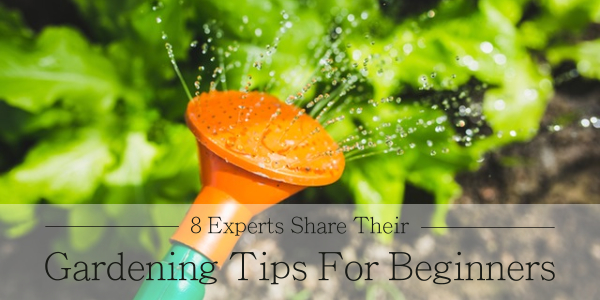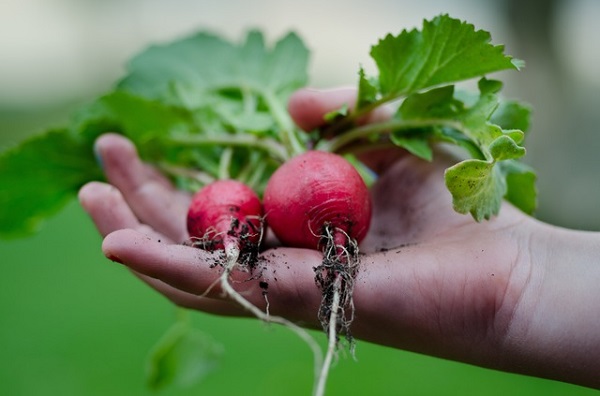| Tags | design and inspiration fun and interesting cleaning and maintenance garden bridge guide great outdoors guide children seating show all posts |
8 Gardening Tips For Beginners (From The Experts)
If you're keen to get green-fingered, knowing where to start can be hard.
Many seasoned gardeners make pruning, planting, potting and picking look so effortless. But if you're new to the gardening game, it might be harder than you think to turn your plans into reality.
That's why we've put together this guide to gardening for beginners... With helpful tips from some of our favourite gardening experts.

Gardening Tips For Beginners
We asked eight gardening bloggers:
"What is your number one tip for gardening beginners?"
This is what they had to say...
Don't be overambitious
"It's easy to be dazzled by other gardeners crowing over their enormous onions, high yielding strawberries or pristine petunias but size, quantity and a perfect appearance can take a lot of time, effort and money. Take a more relaxed approach and enjoy whatever comes your way – that leek may be on the thin side, and not especially straight, but it'll be the best tasting leek you've ever had simply because you grew it yourself." ~ Nick, Two Thirsty Gardeners
Invest in a compost bin
"Making your own compost is the best way to improve your garden soil, and - once you’ve made or paid for a bin - is completely free! Adding compost to your soil improves both its ability to hold water and to drain properly. It supports the web of life in the soil, which in turn will help to feed your plants and keep them healthy. Making compost doesn’t have to be a chore - cold composting simply involves chucking garden and suitable kitchen waste into a bin and letting it rot." ~ Emma, The Unconventional Gardener
Garden by design
"Don't beat yourself up if your garden doesn't look like it comes from the pages of a magazine, but whatever you do don't garden by accident - garden by design!
Where to start? Well, that’s a good question and no matter what your little patch is like, the answer’s the same. Think about where you want to be. The things that you think are essential in a garden. It's amazing how much a little bit of planning during the dark winter days can do. :-)
Pop over to Woolly Green, where you'll find nice friendly gardeners who aren't perfect either!" ~ Jude, Woolly Green
Keep it simple

Lucy from The Smallest Smallholding says it pays to start with just a few different varieties if you're growing your own veg.
"If you're just starting out growing your own veg, then my advice is to stick with just a few key varieties and see how you go. It's fairly common for people to get overwhelmed or (in my case) overenthusiastic and try too many things at first, and then have trouble producing good yields! Do your research on best growing tips for what you've chosen, and reap the rewards – you can always grow more the following season. Keep it simple and get it right; and then each year you learn something new." ~ Lucy, The Smallest Smallholding
Prepare your soil
"Time spent on soil preparation is seldom wasted. Feed your soil and get it into good condition BEFORE planting anything. Research what type of soil is best for your chosen plants, and add grit, sand, manure, compost, lime etc as appropriate. Good drainage is important too." ~ Mark, Mark's Veg Plot
Keep it small and manageable
"Start small, then you can manage the crops and weeds more easily and will be encouraged by success. Just one bed of 4x8ft (1.2x2,4m) can grow a lot and as you learn how to grow better, you can add a bed or two at any time, simply by filling a frame with organic matter, on top of undug soil.
Its a problem for beginners at allotments that they are too big an area so if offered one, see if you can share it and also use a big sheet of black polythene to cover and kill weeds on areas you are not using initially.
Beginners often underestimate the time needed to grow great veg, they are more difficult than flowers, so keep it manageable." ~ Charles, Charles Dowding
Know your garden
"Before you do any actual gardening, take some time to really understand your garden. It’s so tempting to dive in and buy lots of plants, but if they’re not suited to the conditions in your garden they won’t thrive. Think about the direction your garden faces, how much sun, shade and wind it gets, and the type of soil you have. Once you have this information, make sure you choose plants that naturally thrive in these conditions. You’ll avoid wasting time and money on plants that won’t survive, and you’ll create a lovely garden much quicker too." ~ Catherine, Growing Family
Weed and mulch to take control
"My number one tip for gardening beginners is not to do anything dramatic until you understand the garden. Just weed and mulch, working your way round the garden and getting to know what weeds are, getting to know the plants from close-up. (Mulching is covering the weeded earth with compost or well-rotted manure). Once you have weeded and mulched the entire garden, you will feel much more in control.
Even if your garden is at the big end of middlesized, just fifteen minutes of weeding and mulching a day will get the whole garden done in a month, so you never feel overwhelmed. I was given this advice by a horticulturalist friend when we moved into a house with a garden for the first time. It worked beautifully." ~ Alexandra, The Middle Sized Garden
What have you learnt as a beginner gardener?
Whether you're a seasoned gardener, or you're just starting out on your green-fingered adventure, you've more than likely learned a lot of lessons already. And the tips above from our gardening experts will definitely help you to take control of your garden and enjoy the experience.
Do you have any further ideas to share with beginner garderners? Leave them in the comments below; we'd love to hear from you!
